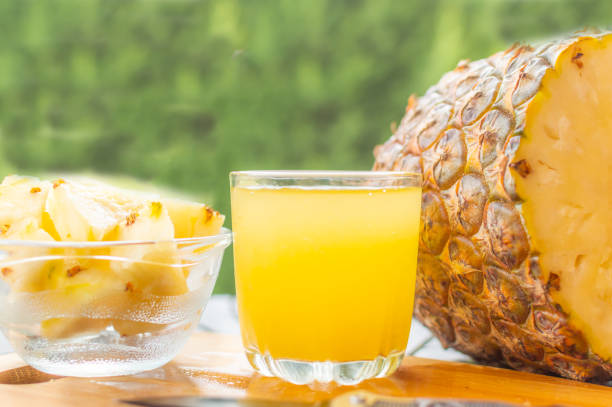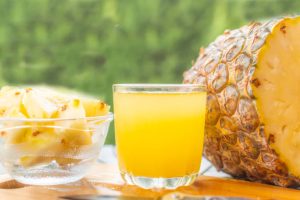Five possible health benefits of pineapple juice

Pineapple juice, rich in vitamins, minerals, and antioxidants, is a common base for cocktails and smoothies. It’s even useful for tenderizing meat.
The pineapple, so called because of its pinecone-like appearance, has been used for many years as an age-old home medicine for inflammation and stomach problems. Its possible immune-boosting properties and capacity to speed up healing have also been investigated.
Though pineapple comes in over a hundred varieties, only eight are cultivated for economic purposes.
In this piece, we look at a few potential health advantages of pineapple juice use. We also look at some considerations about juice intake and some suggestions for incorporating pineapple juice into a diet.

Five health benefits
Here are a number of possible health benefits from drinking pineapple juice in moderation:
1. Boosting the immune system
In one study conducted in the Philippines, researchers examined the effects of pineapple in school-aged children.
Those who were given canned pineapple daily developed fewer viral and bacterial infections than those who did not eat canned pineapple. Their recovery time from these illnesses was also shortened.
2. Digestion
Bromelain is an enzyme contained in the pineapple stem and juice that helps to break down and digest proteins. Bromelain in capsule form has also been shown to reduce swelling, bruising, healing time, and pain after surgery.
Consuming pineapple and pineapple juice will not provide enough bromelain to be used as medical treatment for healing, however. Common processing procedures used when making pineapple juice severely decrease the amount of bromelain contained in the juice.
3. Cancer
One laboratory study, in which fresh pineapple juice was used, found that the juice from the core, stem, and flesh all suppressed growth of ovarian and colon cancer cells.
Further studies in humans need to be conducted before any connections between pineapple juice and cancer are made.
According to the Harvard School of Public Health’s Department of Nutrition, beta-carotene may play a protective role against prostate cancer.
In another study, people who ate more beta-carotene-containing foods than others were found to have a reduced risk of developing colon cancer.
4. Skin
Pineapple juice contains vitamin C and beta-carotene. These antioxidants can help to fight skin damage caused by the sun and pollution, reduce wrinkles, and improve overall skin texture.
Vitamin C also helps with collagen formation, which is a common protein in the body that gives the skin its strength and structure.
The vitamin C found in pineapple may help keep eyes healthy and free from cataracts.
5. Eyes
One study found that diets rich in vitamin C can cut the risk of cataract formation by one-third. The researchers examined the effects of such diets in 1,000 pairs of female twins in the United Kingdom.
The fluid inside the eye contains vitamin C, and a diet rich in vitamin C may help to maintain that fluid and prevent the breakdown that leads to cataracts.
Nutrition breakdown
According to the United States Department of Agriculture Agricultural Research Service, one cup (250 grams) of canned, unsweetened pineapple juice contains:
- 132 calories
- 0.9 grams of protein
- 0.3 grams of fat
- 32 grams of carbohydrate
- 0.5 grams of fiber
- 25 grams of sugar
One cup of pineapple juice provides 63 percent of an adult’s daily needs for manganese, 42 percent of their daily vitamin C, and 10 percent or more of thiamin, vitamin B-6, and folate.
Pineapple also contains the following nutrients:
- potassium
- magnesium
- copper
- beta-carotene
Diet tips
People should be sure to pay attention to serving size when it comes to all fruit juices. Although they do contain vitamins and minerals, they are also high in carbohydrates and sugars.
Pineapple juice has a naturally sweet but tart taste. It is most healthful to choose pineapple juice that does not contain added sugar.
People can try to make their own pineapple juice at home to get the most nutritional benefits. The processing and storing of juice often decreases nutrient content.
When someone is making their own juice, they can be sure there are no added preservatives or sweeteners. People can also be certain that they are getting the most nutrients from the ripe fruit.





